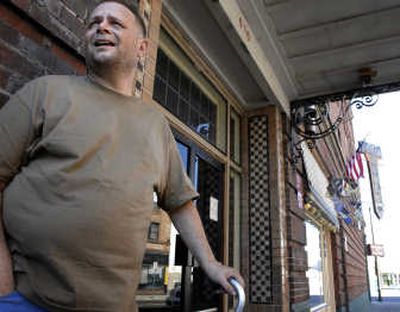Otis ouster on hold for now

The 107 residents of the Otis Hotel, including almost 30 sex offenders, have received at least a few days’ reprieve from being forced out of their homes.
Chris Batten, whose development company hopes to take possession of the building Aug. 1, said he has held off sending eviction notices at least a few days as he negotiates with city and county leaders.
He is asking officials to pay expenses for his firm, RenCorp, to keep the low-income apartments open up to nine extra months so agencies can find new homes for tenants.
Earlier this week, the Spokane City Council earmarked $250,000 of unspent money from 2006 to help people forced from a strip of buildings being redeveloped along West First Avenue. Besides the Otis, it includes the New Madison Apartments and the Commercial Building, which is being converted into a manufacturing plant for next-generation DVDs.
Last week, Batten floated a proposal requesting up to $180,000 from the city and $220,000 of federal money administered by the county.
Spokane’s chief operating officer, John Pilcher, said the city is meeting with Batten in an attempt to prevent evictions. Pilcher added, however, that the city is hesitant to spend money on the Otis if the residents end up in the same tenuous position in nine months.
“We’re trying to build a solution that puts us in a better position,” he said.
Besides Batten’s plan, the city’s money could be used by low-income housing agencies to cover moving expenses, first-month rents, security deposits and other costs for those displaced.
The allocation, sponsored by Council President Joe Shogan, was approved on a 6-0 vote.
“If we don’t provide the assistance here in this really needful situation, we’re probably going to create an even greater harm for our community,” said City Councilman Bob Apple.
Otis resident Keith Isherwood, who has lived in the building about 18 years, told council members that they need to make sure the assistance finds its way to tenants and doesn’t get trapped in bureaucracy.
Isherwood, who is unemployed and paying $265 a month for rent, said he – like many Otis residents – fears an eviction could force them to the streets.
“People downtown do need to have some help to find some other housing within their needs,” he said.
RenCorp plans to turn the Otis and New Madison into renovated apartments. Although Batten has planned to earmark some units for low-income residents, housing officials say it’s unlikely any tenants now living in the buildings would be able to afford them.
The Otis is by far the largest in the strip being redeveloped. Although it has long been a symbol of poverty in Spokane, the building’s cheap rent and lack of barriers for people with criminal records have kept numerous people from homelessness.
Agency officials note that many in the building are without a record and likely will find a place, but that will take time.
The loss of the housing is causing a growing concern about the impact of displacements on community safety.
Spokane County sheriff’s Detective Dave Bentley, who monitors sex offenders in Spokane Valley and the county, said law enforcement is concerned about the potential closure of the buildings, in part, because homeless offenders are harder to track.
“Anytime you add risk factors the likelihood of doing something wrong increases,” Bentley said.
“Make anybody homeless, and bad things might happen.”
Todd Wiggs, a state community corrections supervisor, said the problem likely will only get worse in the coming years as owners of other buildings where sex offenders live come under pressure to sell.
“Having housing mitigates the risk offenders pose to all of us,” Wiggs said. “We’ve been fortunate to have that resource. Without it, I think we’re all going to see more transient offenders.”
As of last month, the Otis housed 27 sex offenders, including 10 listed among the category most likely to commit more sex crimes, said Cindy Algeo, executive director of the Spokane low-income housing consortium.
Batten warned that even with the temporary measure, some residents likely will not find a place to live.
“At the end of the day, not everybody is going to get placed,” Batten said.
Housing and law enforcement officials said there are few places for sex offenders to go.
“There’s a need for housing of these clients, and that’s a difficult issue that no one wants to get behind,” said Steve Cervantes, executive director of the Spokane Housing Authority.
It is, however, one of the issues that is expected to be tackled by Mayor Dennis Hession’s task force examining low-income housing needs.
The group met for the first time Wednesday.
“I don’t think the private sector is going to go out and create housing for sex offenders,” said Batten, who is a member of the group. “It think it’s a Department of Corrections issue.”
Wiggs, of the Department of Corrections, disagreed.
“It is not just a Department of Corrections problem,” he said. “It is a community problem.”
Cervantes, whose group is helping find places to live for those displaced from the Commercial Building, said as a last resort, Batten’s plan for the Otis might be necessary. But because of the condition of the building, public agencies shouldn’t sink much money into the structure.
In the long run, people in different income brackets should be better spread throughout the community, Cervantes said.
“The end result might be good,” Cervantes said. “It’s how you do it. You don’t do it 150 people at a time.”